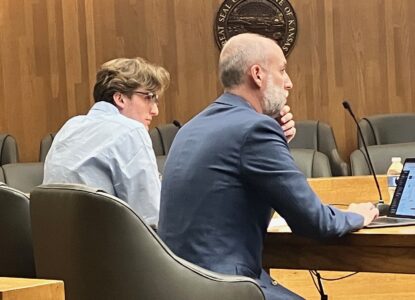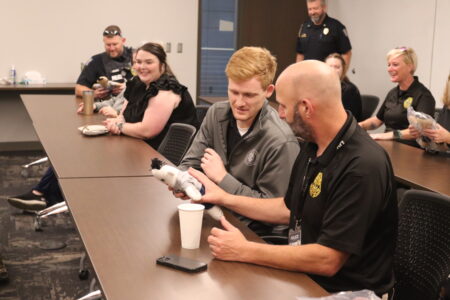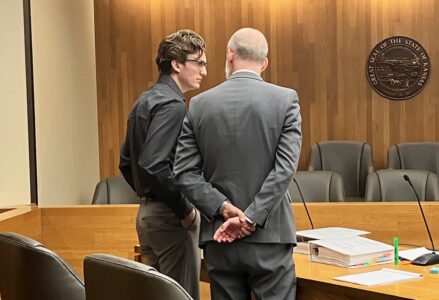Jury finds man guilty of 1st-degree murder in killing in front of library, rejecting self-defense claim
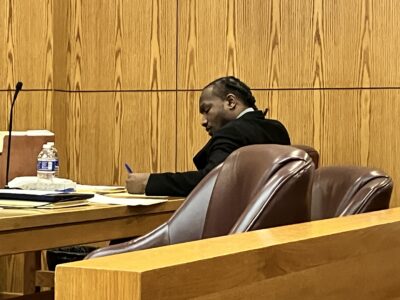
photo by: Kim Callahan/Journal-World
Nicholas Beaver is pictured at his murder trial Thursday, July 24, 2025, in Douglas County District Court.
Updated at 4:05 p.m. Thursday, July 24
A jury on Thursday found a man guilty of first-degree murder in the shooting death of a 39-year-old man last year in downtown Lawrence, rejecting the shooter’s claim of self-defense.
Nicholas Beaver, 34, was accused of gunning down Vincent Lee Walker on March 6, 2024, in front of the Lawrence Public Library.
The jurors — eight women and four men — began deliberating at 10:50 a.m. and returned their verdict about two hours later, around 1 p.m.
In closing arguments Thursday morning, attorneys attempted to persuade the jurors of two very different versions of events.
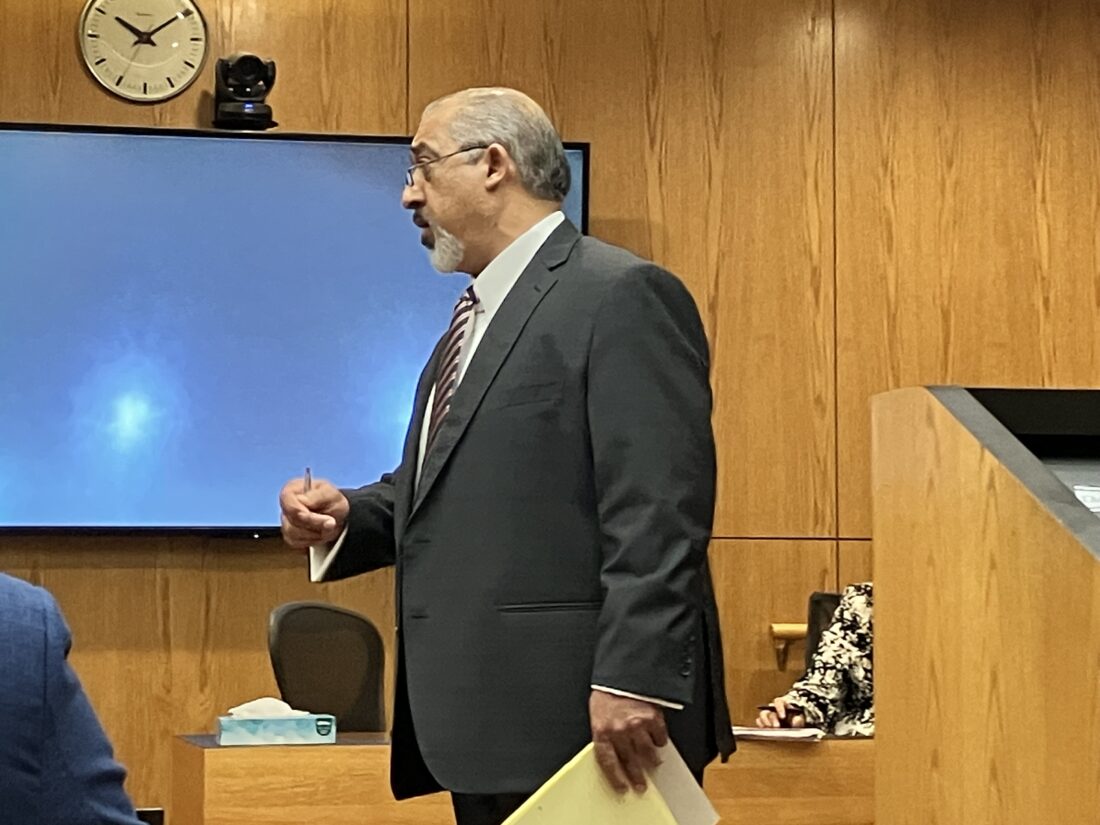
photo by: Kim Callahan/Journal-World
Defense attorney Razmi Tahirkheli makes his closing argument in the murder trial of Nicholas Beaver Thursday, July 24, 2025, in Douglas County District Court.
Defense attorney Razmi Tahirkheli argued that Beaver was acting in self-defense when he pumped three bullets into Walker at the bus stop. He said that Walker had struck Beaver with his shoulder and was yelling and behaving aggressively, causing Beaver to believe he was in so much danger that he had to use deadly force.
Beaver testified that Walker had threatened to cut him up “in little bitty pieces,” but no other witnesses testified about hearing such a threat, and none, including Beaver, testified that Walker had a knife in his hand.
Tahirkheli additionally suggested that Beaver was being “framed” because of his race.
“Mr. Beaver is a Black, homeless man. That’s the reality in this country,” Tahirkheli said, inviting jurors to speculate on how a white woman in Beaver’s shoes would be treated by the state.
“They’re using his homelessness, the way he talks, his race to convince you,” he told jurors.
Deputy District Attorney David Greenwald said that Tahirkheli’s mention of race was simply an attempt to “shift the focus from the evidence” and that Tahirkheli wanted the jury to ignore the fact that the victim was also Black.
Greenwald argued that it was not remotely a case of self-defense, but one of “ego,” wherein Beaver felt disrespected by Walker, who had spit on him, and simply decided to kill him.
“He was disrespected, so he decided to take action; that’s premeditation,” Greenwald told the jury, noting that Beaver’s deadly reaction came not as the two men were “nose to nose” but after Walker, who was unarmed, had turned away.
Greenwald said Beaver had to pull out his gun, cock it, aim it and pull the trigger “three separate times.”
The three bullets entered Walker’s left side, indicating, Greenwald argued, that he was turned away and not an imminent threat to Beaver.
The state had to prove to the jury beyond a reasonable doubt that Beaver had not acted in self-defense.
The law allows a person to use force that is likely to cause death or great bodily harm if he reasonably believes such force is necessary to prevent death or great bodily harm to himself from the other person’s imminent use of unlawful force.
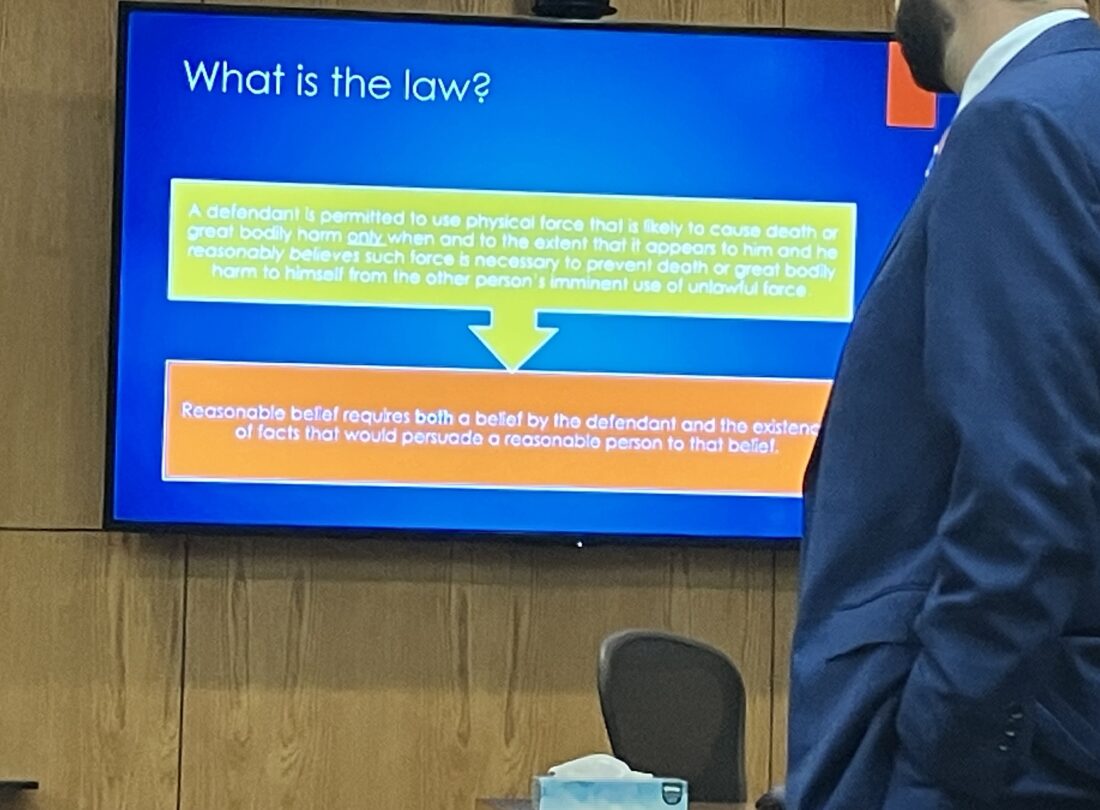
photo by: Kim Callahan/Journal-World
The state displays a summary of self-defense law for the jury at the murder trial of Nicholas Beaver on Thursday, July 24, 2025, in Douglas County District Court.
Greenwald also reminded the jury of a string of evidence that Beaver had discarded along a path from Vermont Street to Iowa Street, including a gun, clothing and a bicycle with his DNA on them.
He said Beaver told different versions of what happened that night, including voluntarily denying to police that he had shot Walker and matter-of-factly stating in a jailhouse video call to two women that “I killed the (N-word).” But it was “only yesterday,” when Beaver took the stand at his trial, Greenwald said, that Beaver claimed that he had been afraid for his safety and acted in self-defense.
Two surveillance videos were entered into evidence: one from a climbing gym north of the bus stop where the incident occurred, which showed small, unidentifiable people, with one of them falling to the ground as three gunshots rang out; and another from the public library that, when zoomed in, showed figures in an apparent altercation across the street.
“Go back and watch the videos; crank up the volume,” Greenwald told the jurors, encouraging them to interact with the footage in a way they couldn’t while seated in the courtroom.
Tahirkheli meanwhile cautioned them that “those videos aren’t that clear.”
In his final statement to the jury, Tahirkheli said that if Beaver’s behavior that day wasn’t self-defense then “that law is worthless,” while Greenwald emphasized that “mere words” weren’t enough to justify lethal force.
“Vincent Walker died because of Nicholas Beaver’s ego,” Greenwald said, “not because he was a threat.”
Jurors had the option of acquitting Beaver or of returning a guilty verdict on first-degree murder, second-degree murder, voluntary manslaughter or involuntary manslaughter. They chose the most serious offense, which required a finding that Beaver acted with premeditation.
Judge Stacey Donovan did not immediately set a date for sentencing.
Beaver is also facing multiple charges of criminal use of a credit card relating to clothes Beaver was wearing on the day he killed Walker. Donovan previously denied the state’s request to consolidate those charges with the murder case, deeming the stolen credit card case too prejudicial since he hasn’t been convicted of those charges.
Beaver also has an open felony criminal threat case pending in Douglas County, as well as felony convictions for battery in Shawnee County.

photo by: Contributed
Vincent Lee Walker




